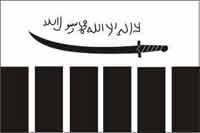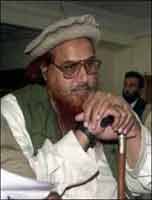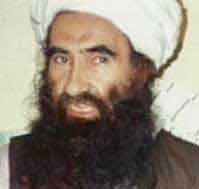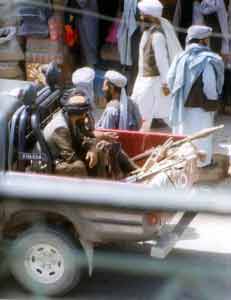|
Now that the American president has finally committed himself to a mini-surge, and also announced an exit plan as part of a reworked Af-Pak policy, the implications for his military commanders, and the region, are enormous. A look at the possible scenarios, by Rajiv Singh. American president, Barack Obama, finally made up his mind on the kind of commitment he would like to make towards the Afghanistan war effort and in the process decided to have his cake and eat it too. Extra troops will be committed to the war effort, he announced, but he would also like to be out of Afghanistan in 18 months.  | | Source: Central Intelligence Agency | The focus of the new Af-Pak policy would be on infrastructure development around the country and on training the Afghan security apparatus. Afghans ought to be able to assume responsibilities once the International Security Assistance Force in Afghanistan, the nomenclature under which American and NATO forces operate, begin to vacate the premises. So far, so good, for as plans go, it is about as sound as it can possibly get. Not for nothing is Afghanistan referred to as the graveyard of invading forces, and any declaration by an occupation force to depart can only be commended for the common sense principles that underlie it. The new Af-Pak plan does two things simultaneously for a beleaguered American president it signals his commitment to stay the course, and also reassures a home audience, tired of eight years of war in Iraq and Afghanistan, that the end may be in sight. Having it both ways on any issue is the sovereign right of any self-respecting politician, and it is to the US president's credit that he has come up with a plan that appears to allow him to have his cake and eat it too to balance his international military commitments and domestic political needs all at the same time. New Af-Pak
The new Af-Pak policy recognises the need to shift emphasis in Afghanistan from 'warring' to 'building' from 'winning' against the Taliban to 'denying' them access to population centres and the political throne at Kabul. In the process, it concedes the point, perhaps unwittingly, that the Taliban might not be defeated in the 18-month operational time span now laid down. So the need to 'deny' them control of Kabul and Kandahar and let the passage of time, and the impotence and lack of influence that comes with it, do the damage.  | | ISAF troops on patrol | And so, the new Af-Pak policy seems to say that even as the jihadi sulks in the ravines and valleys and the inaccessible caves of that stunning landscape, we will go about setting up the basic building blocks of a nation. Not bad - as ideas go. But at the end of the day if the proof of the fighting should be evidenced in the killing, then the proof of infrastructure investment should be evident in roads, power plants, hospitals, schools and services that either have, or failed, to come up. Critically, the evidence will be seen in training imparted to the populace to enable it to assume responsibilities for civic and military duties once the patrons depart. What is notable about the new Af-Pak policy, it may be mentioned, is the manner in which it has been introduced. By calling up different capitals around the world before he went public with his announcement, Obama has departed substantially from the cowboy creed of his predecessor (''...with us or against us...''). It was a nice gesture, to take all stakeholders onboard before stepping on the podium. The gesture also allows Washington to put moral pressure on the stakeholders for greater involvement in the conflict - it's your war as much as ours. An obvious benefit derived from giving the cowboy credo of yesteryears the boot. New Delhi must have breathed a huge sigh of relief, as the list of phone calls included our own Dr Manmohan Singh. In the course of his Washington visit this November, the learned doctor of economics had gone substantially blue in the face insisting he was consulted on regional and global issues by the Americans, though the evidence all pointed the wrong way.  | | Taliban chief Mullah Omar | As the New Delhi establishment battles near irrelevancy under a new political dispensation in Washington, the cosmetics of a summit meet in Washington have failed to cover up the embarrassment that comes from a shift in priorities and friendships for the Obama administration. Ind-Af
Now that the contours of the new Af-Pak policy have been outlined, India may find some reason to congratulate itself - quietly. Its policy of engaging with a war zone through development work has now become the cornerstone of the new Af-Pak policy. Resisting all allurements from the cowboys of the past, and parking a division or two of its armed forces in the Afghan provinces in the process, India went about building civic infrastructure, training civil and military personnel, constructing power plants and, critically, roads that release Afghanistan from the stranglehold of Pakistani access points from Karachi. So far this unglamorous development work had drawn just polite appreciation from world leaders. It has now been adopted as the credo for the new Af-Pak policy. The Pakistanis, and Americans, may have had reason to be irritated by things Indian on Afghan turf but now they will just have to learn to emulate the Indian example and provide the right of way for all things civillian. Taking on Jihadi Joe
 | | Lashkar-e-Toiba | Most critically - for the first time, perhaps - the new Af-Pak policy sheds ambivalence towards the patrons of jihadis. Glib rationalisations have allowed these sponsors to get away with playing both sides of the game for far too long. The new policy pronouncement appears to shed ambiguity regarding the sponsors and safe havens and expresses urgency and resolve in combating the festering evil that pretends to be a jihad, or holy war. There is a suggestion that larger action will now be forthcoming on ''both sides of the border.'' "We are in Afghanistan to prevent a cancer from once again spreading through that country. But this same cancer has also taken root in the border region of Pakistan. That is why we need a strategy that works on both sides of the border," Obama said in his Af-Pak speech at the West Point Military Academy. It remains to be seen what form such a strategy takes. Will it be the same as now, with the Pakistanis on their side of the border playing out time, letting all know that it is only a matter of time before the American devil leaves so just hold on tight, and the ISAF on its side of the border seething with fury and impotence as jihadi foot soldiers and commanders seek sustenance and safety across the border. Or are the ISAF commanders going to cross the Durand Line and go after Jihadi Joe and his sanctuaries. Or are we reading too much into what may only be an innocuous statement? Common sense dictates, however, that pressure on Americans and Pakistanis to deliver results will be enormous. There is no choice, because of the incredibly short time schedule provided for the American military, and their civilian counterparts, to complete the job and get out of the war zone.  | | Lashkar-e-Toiba chief Hafiz Saeed | We need to keep in mind that the last of the 30,000 additional troops to be inducted into the war zone will step into place only around July 2010. As per the 18-month time schedule, it will then have only 12 months to do its job before the process of handing over charge to the Afghans begins. The time for cute prevarications from the Pakistani allies may now be over. Or, as always, this may be just another bout of wishful thinking for all concerned- the jihadi rat, we will discover, has once again disappeared down a hole. Bags of gold
As some experts, including Russian ones, point out, every surge in international troop numbers in Afghanistan has been matched with a corresponding increase in Taliban numbers. Every time the ISAF has enlarged its footprint in Afghanistan, it has been promptly matched with a corresponding Talibani surge. Poverty, narcotics financing and a determined military establishment, which reckons itself as front-line warriors of an Islamic world, is a volatile mix. A mix that allows a military or quasi-military establishment, such as that exists in Pakistan, to exploit the Afghanistan situation mercilessly and in perpetuity. Insurgencies, or wars, don't run on sermons and ideas but require other lubricants, such as funding. There may be discontent, but without funding there will be no insurrection with armed militias battling it out with opposing forces for years on end.  | | Haqqani Network chief Jalaluddin Haqqani | Talibani and other jihadi organisations have been accessing vast amount of funding for years on end, as is evidenced through their campaigns both in Afghanistan and Pakistan as well as around the world. An obvious source of funding for the Taliban, the jihadi outfits and the ISI is the narcotics network operating out of Afghanistan . But that is not the only one. Donations made to jihadi organisations in the Middle East are huge and vast sums of money flow inwards to Pakistan to fill their coffers. How can such a source be shut down and Jihadi Joe denied access? American funding, now being made available to Pakistan under the terms of the Kerry-Lugar dispensation, is bound to be another source. The money is to be made available for all kinds of reasons - primarily civil. But here we cannot shut our eyes to another curious fact that determines day-to-day life in Pakistan - something referred to as MILBUS, or Military Business in Pakistan. MILBUS, according to Dr. Ayesha Siddiqa Agha, author of the book The Military Inc: Inside Pakistan's Military Economy includes banks, insurance, cereals, fertilizer, cement, hospitals and clinics, radio and TV, schools, universities and institutes, etc. It is her assertion that the military has over 7 per cent share of the country's GDP, and controls one-third of heavy manufacturing in the country, along with 6-7 per cent of private sector assets. When the contracts, arising from implementing the provisions of the Kerry-Lugar bill, begin to flow who is going to be the prime beneficiary? If the narcotics trade is substantially disrupted, and funds from the Middle East begin to be intercepted through some mechanism - wishful thinking this - then a useful fallback will be American funding from the Kerry-Lugar bill collected by the MILBUS apparatus inside Pakistan. Inflated bills for services ought to provide quite a few hundreds of millions of dollars for holy activities - such as financing jihad.  | | Taliban in Herat 2001 | Poverty is the best recruiter for jihad, as some state agencies in Pakistan and America realised very early on in the great game enveloping Afghanistan since 1980. Bags of gold had flowed from CIA and ISI coffers to tribal leaders to marshal their lashkars (militias) to take on the Soviets. Thousands of 'jihadis' from villages and madrassas (seminaries) streamed across the Afghan-Pak border then to 'serve' the cause and were paid handsomely for their services. The pattern has continued to this day. Kasab, the lone survivor of the 26/11 Mumbai carnage, has confessed his father struck a deal for his services for the equivalent of a few thousand US dollars. That kind of money obviously delivered a lot of killing efficiency from a near-derelict who had run away from home and was picked up by pious jihadis from a street in Lahore where he was indulging in petty crime. A full-scale insurgency against ISAF forces in Afghanistan will require financial commitments of huge amounts and these will have to come from somewhere. Alternatively, Jihadi Joe may choose to wait out the 18-month time span when ISAF begins to make its exit and make his moves thereafter. A bit unlikely, though, for the thing with insurgencies is that they may be put on boil now and then, but certainly they have to be kept on simmer always - or they die a natural death. Junking the jihadi
History is once again in the making and a beleaguered American president, battling too many career-breaking issues at the same time, would be interested in giving it a defining shape. Fanciful it may be, and certainly it was not a part of the speech at West Point, but a day or two earlier, a leaked story in The Washington Post suggested that a certain kind of message may have been imparted to the MNNA (Major non-Nato Ally) Pakistan, a kind it may not have received before. The thrust of the story was that Obama's national security advisor, Gen James Jones hand-delivered a two page letter to Pakistani president Asif Ali Zardari in early November which warned the Pakistani president that Pakistan's use of insurgent groups for policy goals "cannot continue." The letter called for closer collaboration against all extremist groups and named five of them the al-Qaida, the Afghan Taliban, the Haqqani network, Lashkar-e-Taiba (LeT) and Tehrik-e-Taliban Pakistan. "Using vague diplomatic language, he said that ambiguity in Pakistan's relationship with any of them could no longer be ignored," The Washington Post reported. More ominously, the daily said, Gen Jones told the top Pakistani leadership that should it fail to deliver, ''...the US may be impelled to use any means at its disposal to rout insurgents based along Pakistan's western and southern borders with Afghanistan." Should the contours of the story hold, then president Obama may have sought to ensure through such a warning that his surge will not be matched by a Talibani surge. With a surplus of Talibanis hanging around jobless in the Pakistani 'frontier land' of Waziristan, Baluchistan and the Punjabi heartland, a Talibani surge should not be too difficult to organise. ''Any means at its disposal...'' has an ominous ring to it - it suggests a spill over of action over the Durand Line. It also suggests a lack of patience for the state of affairs as they have been allowed to persist. A strategy for ''both sides of the border'' may indeed have been formulated by Washington, or all this may just be wishful thinking and so many red herrings fed through the media. One thing is for certain - a strategy for 'both sides of the border' is going to be a dash more difficult to set up and implement than laying down a deadline for exit from Afghanistan.
|